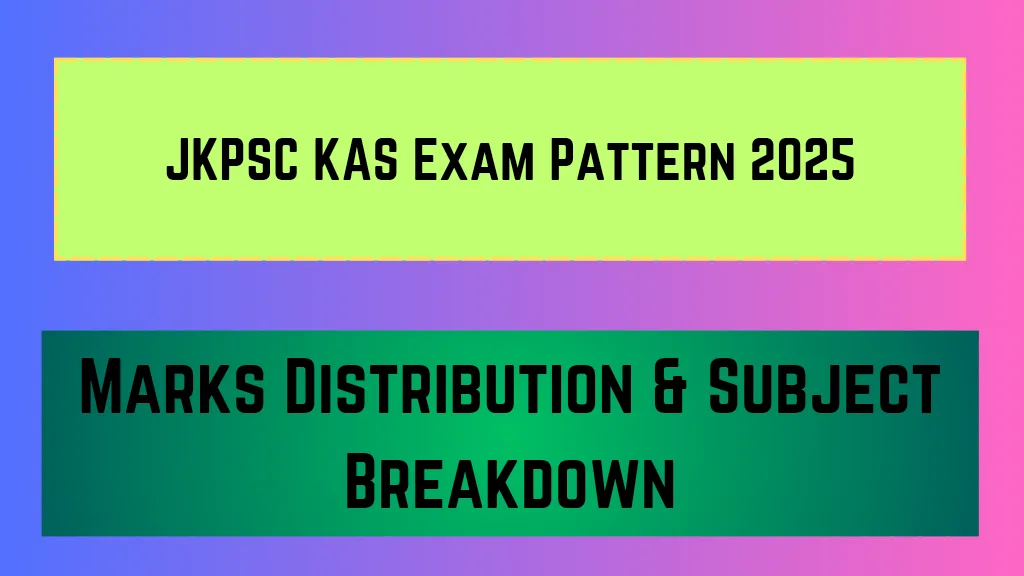The Jammu and Kashmir Public Service Commission (JKPSC) conducts the Combined Competitive Examination (CCE), commonly known as the Jammu and Kashmir Administrative Service (JKAS) exam. Aspiring candidates aiming for administrative positions in the state must understand the exam pattern, marks distribution, and subject breakdown to prepare effectively.
JKPSC KAS Exam Pattern 2025
- Three Stages of Examination: The selection process comprises:
- Preliminary Examination: Objective-type questions.
- Main Examination: Descriptive/essay-type questions.
- Personality Test (Interview): Assessment of candidate’s suitability.
- Preliminary Examination:
- Two papers: General Studies Paper-I and General Studies Paper-II (CSAT).
- Each paper carries 200 marks.
- Paper-II is qualifying with a minimum requirement of 33%.
- Main Examination:
- Eight papers in total.
- Seven papers contribute to the merit list.
- One qualifying paper in English.
- Personality Test (Interview):
- Carries 250 marks.
- Evaluates the candidate’s personality and suitability for administrative roles.
- Total Marks Considered for Final Merit: 2000 marks (1750 from Main Examination + 250 from Interview).
- Official Website: www.jkpsc.nic.in
Detailed Examination Pattern
Preliminary Examination 📝
The Preliminary Examination serves as a screening test to shortlist candidates for the Main Examination.
- Paper-I: General Studies-I
- Marks: 200
- Duration: 2 hours
- Content:
- Current events of national and international importance.
- History of India and Indian National Movement.
- Indian and World Geography.
- Indian Polity and Governance.
- Economic and Social Development.
- Environmental Ecology, Biodiversity, and Climate Change.
- General Science.
- Paper-II: General Studies-II (CSAT)
- Marks: 200
- Duration: 2 hours
- Content:
- Comprehension.
- Interpersonal skills including communication skills.
- Logical reasoning and analytical ability.
- Decision-making and problem-solving.
- General mental ability.
- Basic numeracy and data interpretation (Class X level).
Key Points:
- Both papers consist of objective-type multiple-choice questions.
- Paper-II is qualifying in nature; candidates must secure at least 33% to be eligible for the Main Examination.
- Marks obtained in Paper-I determine selection for the Main Examination.
Main Examination 📚
The Main Examination assesses the in-depth knowledge and analytical abilities of candidates.
- Qualifying Paper:
- English: 300 marks
- Essay writing.
- Comprehension.
- Precis writing.
- Usage and vocabulary.
- English: 300 marks
- Papers Counted for Merit:
- Paper-I: Essay: 250 marks
- Paper-II: General Studies-I: 250 marks
- Indian Heritage and Culture.
- History and Geography of the World and Society.
- Paper-III: General Studies-II: 250 marks
- Governance, Constitution, Polity.
- Social Justice and International Relations.
- Paper-IV: General Studies-III: 250 marks
- Technology, Economic Development.
- Biodiversity, Environment, Security, and Disaster Management.
- Paper-V: General Studies-IV: 250 marks
- Ethics, Integrity, and Aptitude.
- Paper-VI: Optional Subject – Paper 1: 250 marks
- Paper-VII: Optional Subject – Paper 2: 250 marks
Total Marks for Main Examination: 1750
Optional Subjects: Candidates can choose from a list of subjects, including but not limited to:
- Agriculture
- Anthropology
- Botany
- Chemistry
- Civil Engineering
- Commerce and Accountancy
- Economics
- Electrical Engineering
- Geography
- History
- Law
- Management
- Mathematics
- Mechanical Engineering
- Medical Science
- Philosophy
- Physics
- Political Science and International Relations
- Psychology
- Public Administration
- Sociology
- Statistics
- Zoology
- Literature of any one of the following languages: Arabic, Dogri, English, Hindi, Kashmiri, Persian, Punjabi, Sanskrit, Urdu
Key Points:
- All papers are of descriptive/essay type.
- The English paper is qualifying; marks are not counted towards the final merit.
- Candidates must choose one optional subject, comprising two papers.
Personality Test (Interview) 🗣️
- Marks: 250
- Purpose: To assess the candidate’s personal suitability for a career in public service.
- Evaluation Criteria:
- Mental alertness.
- Critical powers of assimilation.
- Clear and logical exposition.
- Balance of judgment.
- Variety and depth of interest.
- Ability for social cohesion and leadership.
- Intellectual and moral integrity.
Final Merit Calculation:
- Total Marks: 2000
- Main Examination: 1750 marks
- Personality Test: 250 marks
Preparation Tips 📚
- Understand the Syllabus: Thoroughly go through the syllabus for each paper to identify key areas of focus.
- Create a Study Plan: Allocate time effectively, ensuring all subjects and topics are covered.
- Regular Revision: Periodically revisit topics to reinforce learning and retention.
- Practice Answer Writing: Develop the skill of articulating thoughts clearly and concisely within the word limit.
- Stay Updated: Keep abreast of current affairs, especially those related to national and international importance.
- Mock Tests: Regularly attempt mock tests to assess preparation levels and identify areas needing improvement.
- Optional Subject Mastery: Choose an optional subject that aligns with your interests and strengths; delve deep into its concepts.
Frequently Asked Questions (FAQs) ❓
Q1: Is there negative marking in the Preliminary Examination?
A1: Yes, there is a penalty for wrong answers in the Preliminary Examination. For each incorrect answer, one-third (0.33) of the marks assigned to that question will be deducted.
Q2: Can I choose different optional subjects for Paper VI and Paper VII in the Main Examination?
A2: No, both Paper VI and Paper VII must pertain to the same optional subject chosen by the candidate.
Q3: Are the marks obtained in the qualifying English paper counted towards the final merit?
A3: No, the English paper is qualifying in nature. Candidates must secure the minimum qualifying marks, but these marks are not counted towards the final merit.
For more detailed information and updates, visit the official JKPSC website. www.jkpsc.nic.in

